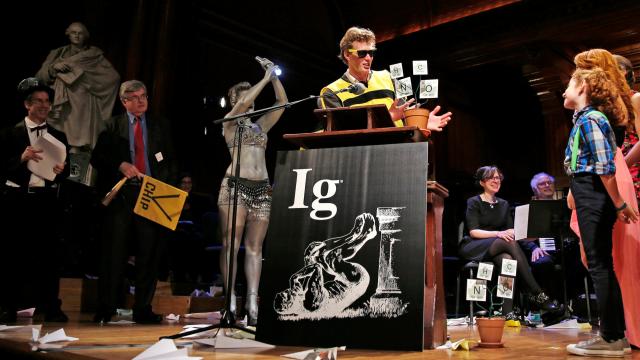For years, the Ig Nobel Awards have been famous for celebrating the most offbeat and ludicrous forms of scientific discovery. And last night, I was lucky enough to attend the 2015 Ig Nobel ceremony, because a friend was the proud winner of an Ig Nobel.
This year was the 25th First Annual Ig Nobel Prize Ceremony, and everyone agreed this was a Very Big Deal. And even though the organisers insisted that this year’s theme, “LIFE,” was not necessarily connected to any of the achievements that were being honored with this year’s prize, a few of the award recipients nevertheless had something to do with biological life. Including sex.
But before the winners were announced, first there were traditions to uphold. The deluge of paper aeroplanes (in which I managed to nail the announcer with my plane — sorry about that). The “Welcome, welcome” speech, delivered by the very tall Bill Hoston and the height-challenged Jean Berko Gleason. The parade of the new Ig Nobel winners and real Nobel Laureates.
One special treat was a public reunion of all of the young women who have performed the official role of “Miss Sweety-Poo” for the awards ceremony. Miss Sweety-Poo is the Ig Nobel timekeeper. If any of the award-acceptance speeches go on too long, an adorable eight-year-old girl marches up to the podium and loudly repeats “Please stop. I’m bored!” until they stop talking. Every former Miss Sweety-Poo gave a short speech about her experience in the role. And each one was interrupted by the dulcet tones of the next Miss Sweety-Poo crying out her boredom.
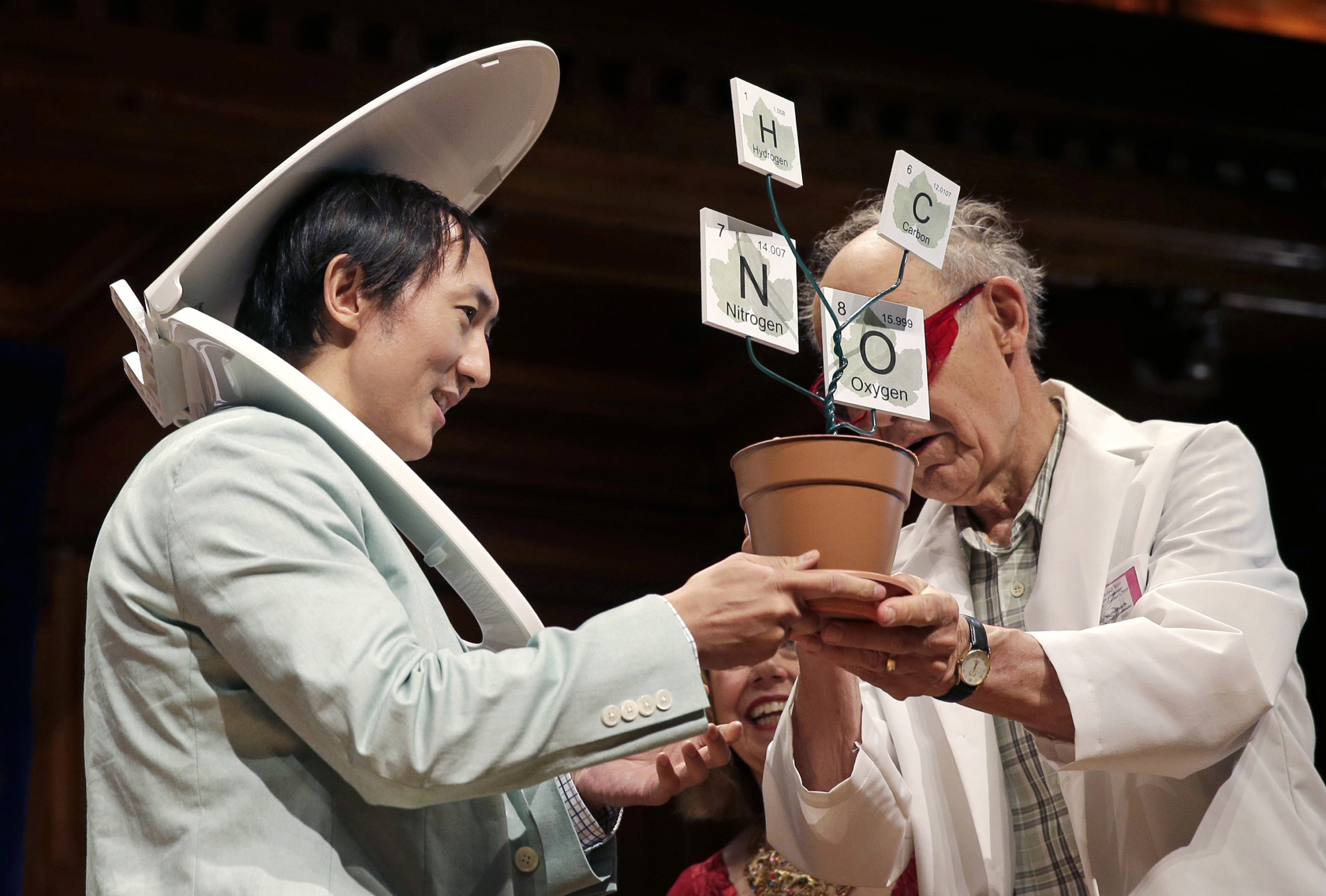
And when everyone was properly impressed, the awards were handed out. This year, winners received: 1) a nonliving tree-like object adorned with the chemical symbols most relevant to LIFE, 2) a piece of paper announcing that they had won an Ig Nobel award, and 3) 10 trillion dollars. Zimbabwean dollars. No shit, it’s one bill.
Other Ig Events were interspersed among the awards, including a beautifully sung 3 act mini-opera about the horrible things that would happen if every species on Earth were collected into one room. Another song was performed by former Ig Awardee Dr. Nakamats, decrying the cancer that will probably take his life. It was a sing-along. I wasn’t quite sure what to make of that — but coming out of left field is apparently a pretty normal part of the Ig Nobel ceremonies.
The winners were:
For Chemistry:
Callum Ormonde, Colin Raston, Tom Yuan, Stephan Kudlacek, Sameeran Kunche, Joshua N. Smith, William A. Brown, Kaitlin Pugliese, Tivoli Olsen, Mariam Iftikhar, and Gregory Weiss, for inventing a chemical recipe to partially un-boil an egg.
Greg Weiss accepted the award dressed in a tie decorated with hard-boiled eggs. And he demonstrated on stage that you can easily tell the difference between hard-boiled and raw eggs if you have a really big hammer.
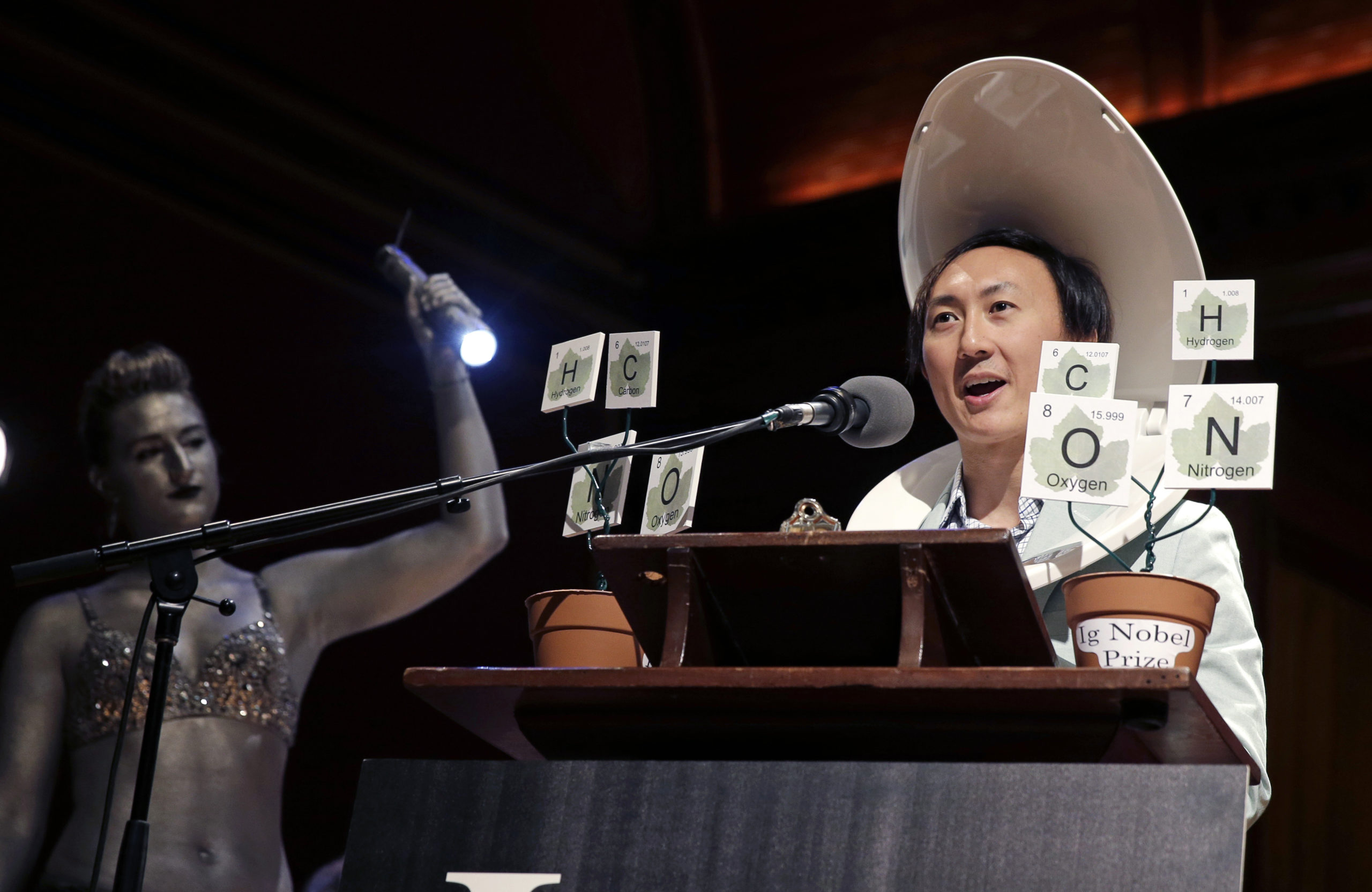
For Physics:
Patricia Yang, David Hu, Jonathan Pham, and Jerome Choo, for testing the biological principle that nearly all mammals empty their bladders in about 21 seconds.
My friend David Hu accepted the award wearing a toilet seat around his neck, and gave a speech that roused the ire of Miss Sweety-Poo. And rightly so — he was thanking far too many people. (Sorry, David.) One of his students tried to bribe the girl with a toy bladder, but no dice. She took the bladder, but still kicked them off stage.
For Literature:
Mark Dingemanse, Francisco Torreira, and Nick J. Enfield, for discovering that the word “huh?” (or its equivalent) seems to exist in every human language.
The winners sent a very short video acceptance speech: Each of them said “huh?”
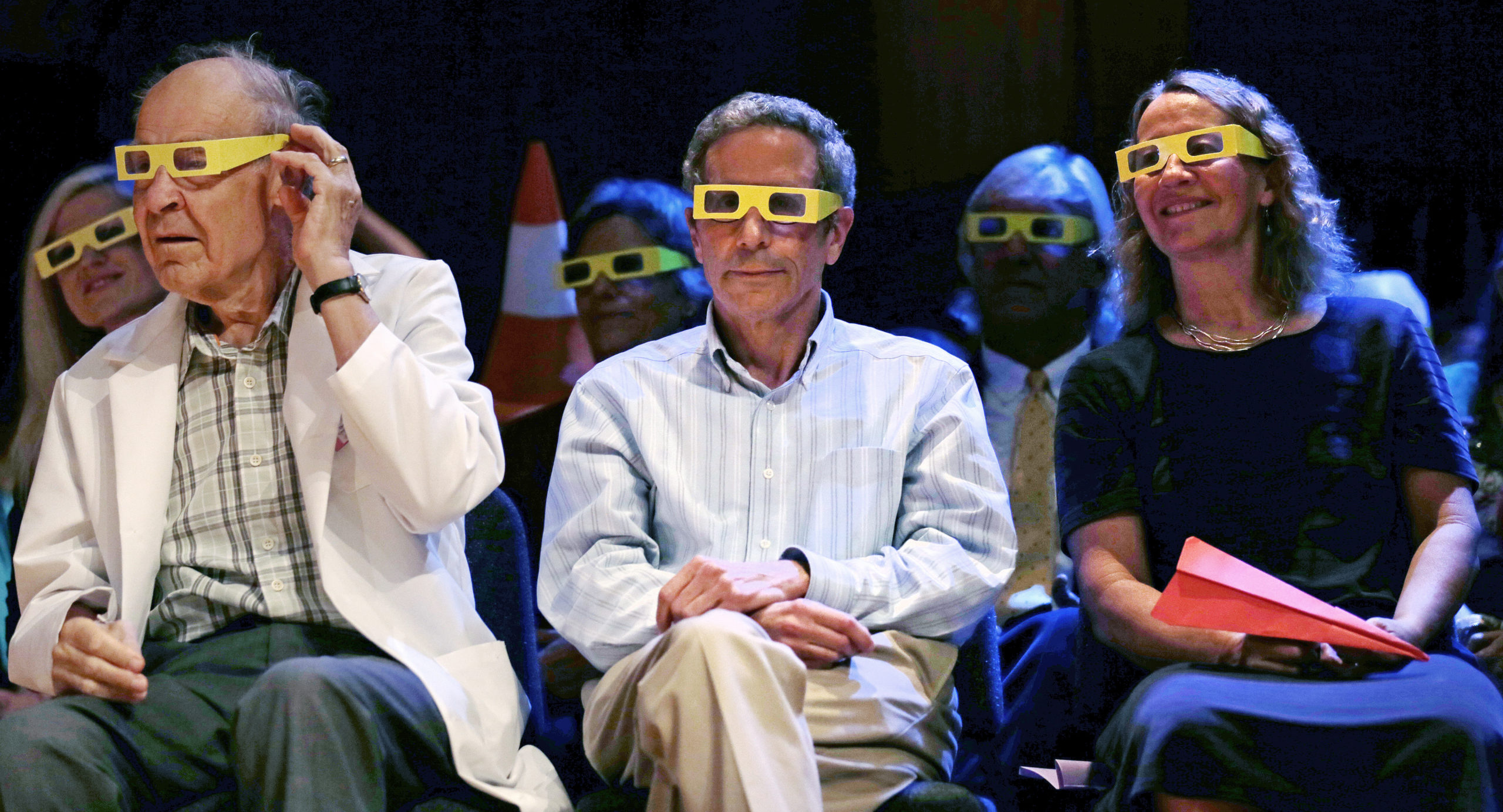
For Management:
Gennaro Bernile, Vineet Bhagwat, and P. Raghavendra Rau, for discovering that many business leaders developed a fondness for risk-taking, when they experienced natural disasters in their childhoods that — for them — had no dire personal consequences.
For Economics:
Bangkok Metropolitan Police, for offering to pay policemen extra cash if the policemen refuse to take bribes.
The winners neither attended nor offered any comment about winning their prize.
For Medicine:
Hajime Kimata, Jaroslava Durdiaková, Peter Celec, Natália Kamodyová, Tatiana Sedláčková, Gabriela Repiská, Barbara Sviežená, and Gabriel Minárik, for experiments to study the biomedical consequences of intense kissing (or in some cases, intercourse).
At this point, the Ig Nobel organisers suggested that members of the audience should take this opportunity to demonstrate the methods the winners used to collect their data. A lot of public snogging followed.
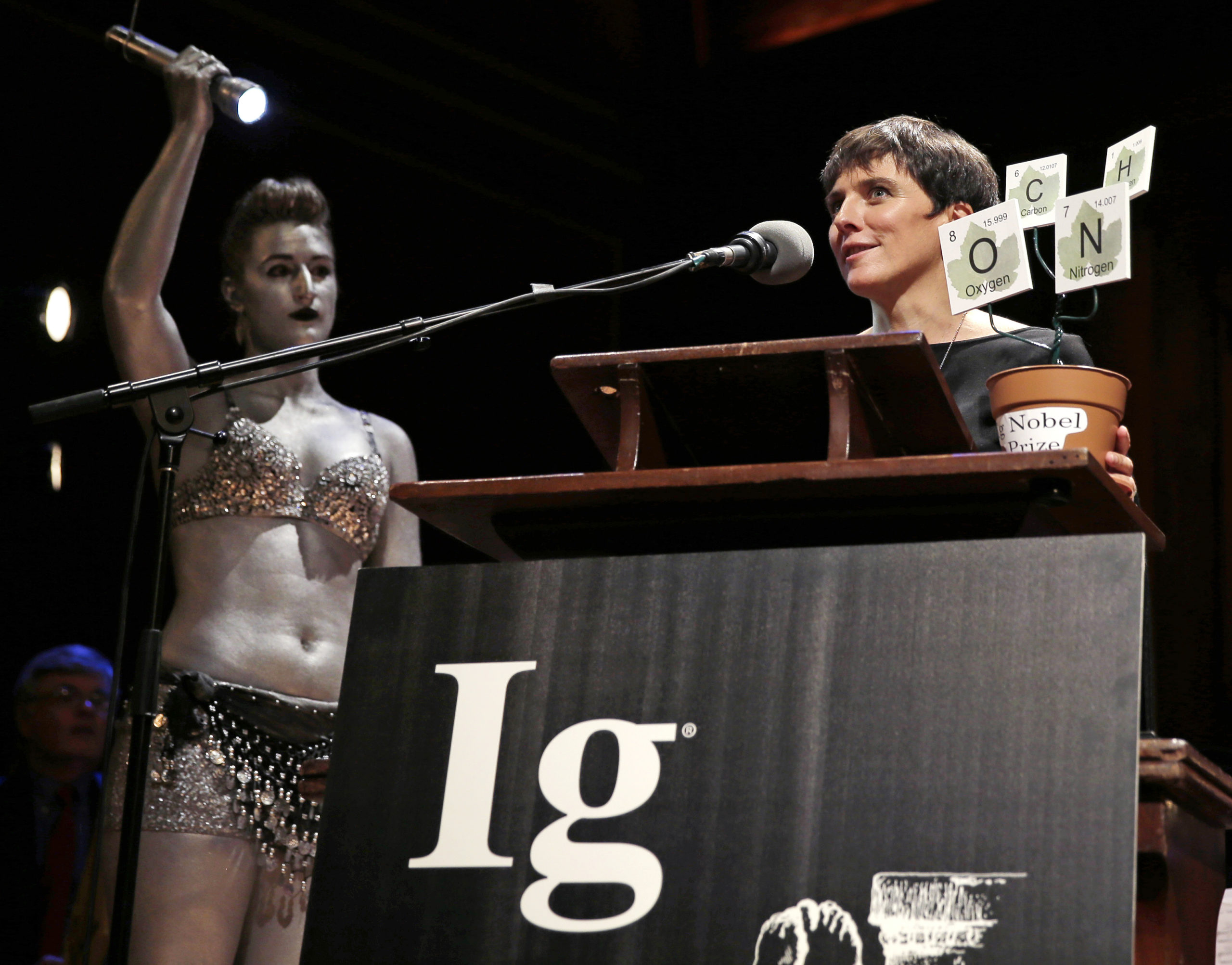
For Mathematics:
Elisabeth Oberzaucher and Karl Grammer, for mathematical techniques aimed at determine whether and how Moulay Ismael, the Sharifian Emperor of Morocco, managed to father 888 children over a 30 year period.
Dr. Oberzaucher gave a short video lecture demonstrating that the man would have had to be having sex at least once, if not twice, a day — every single day — to have even a shot at the accomplishment.
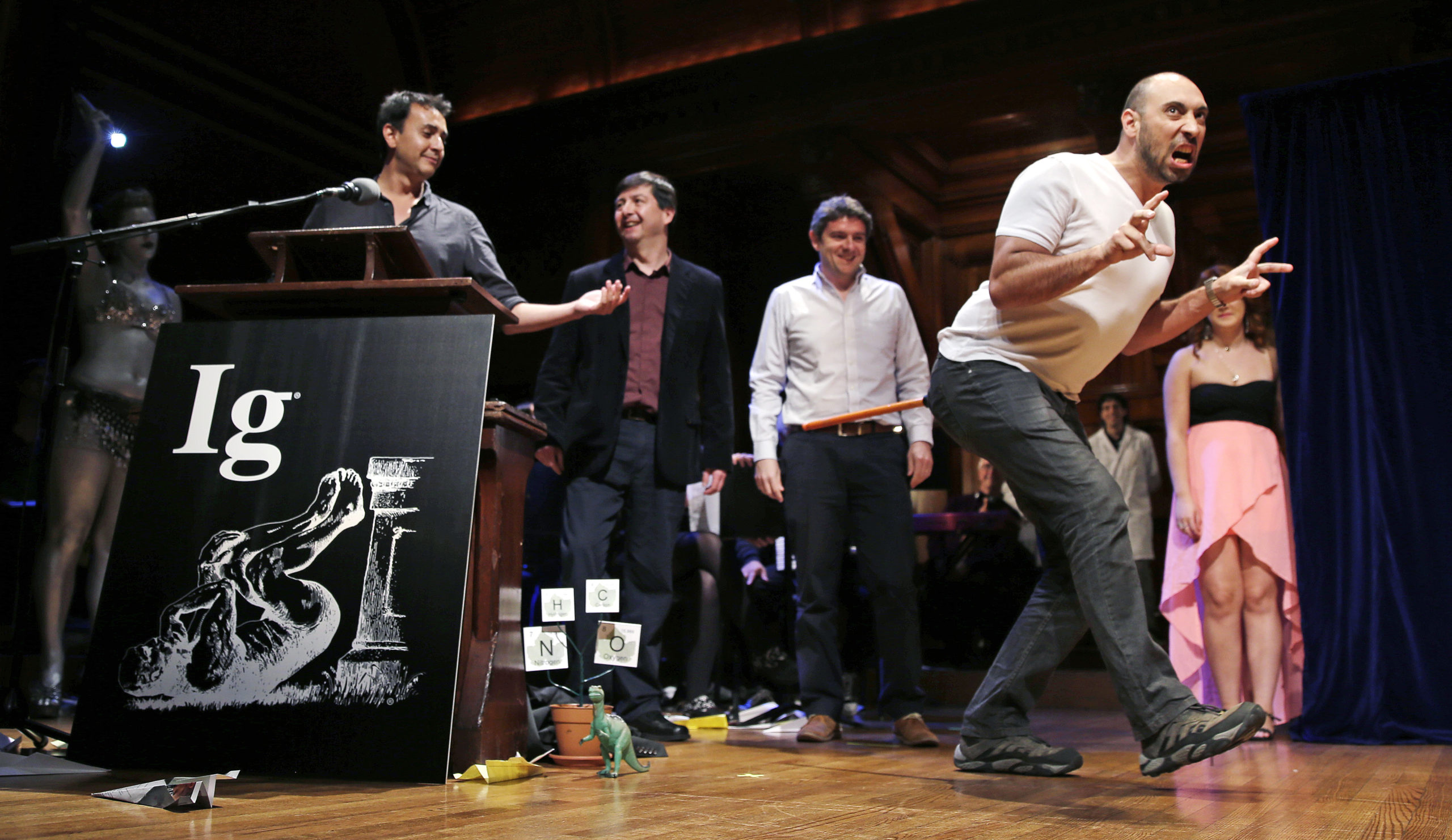
For Biology:
Bruno Grossi, Omar Larach, Mauricio Canals, Rodrigo A. Vásquez, and José Iriarte-Díaz, for determining that when you attach a weighted stick to a chicken’s tail, it walks more like a dinosaur.
The winners accepted their prizes while wearing bathroom plungers stuck to their bottoms, and presented a short video of stick-weighted chickens in motion which made the audience roar with delight.
For Diagnostic Medicine:
Diallah Karim, Anthony Harnden, Nigel D’Souza, Andrew Huang, Abdel Kader Allouni, Helen Ashdown, Richard J. Stevens, and Simon Kreckler, for determining that the amount of pain experienced by a patient when driven over speed bumps is a remarkably accurate way of diagnosing acute appendicitis.
The winners presented a short play that dramatized their findings. One of them can scream really loudly.
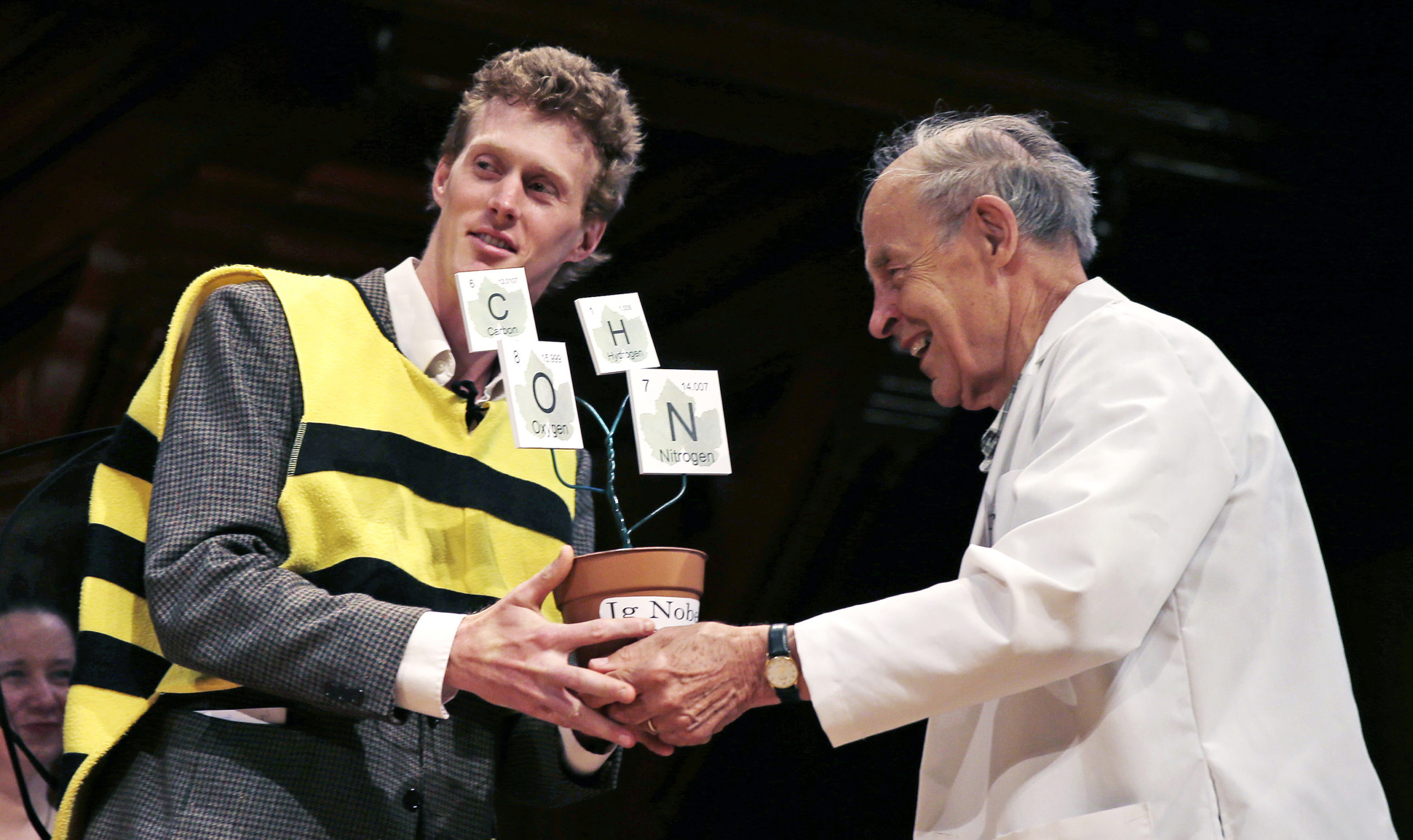
And Finally, For Physiology and Entomology:
Justin Schmidt, for creating the Schmidt Sting Pain Index, useful for rating the relative pain people feel when stung by various insects; and Michael L. Smith, for his self-experimentation determining which areas of the body are most and least painful when stung by honeybees. (Most painful? nostril, upper lip, shaft of penis).
Dr Schmidt gave a rhyming speech, that was cut short by Miss Sweety-Poo. Dr. Smith lamented the pain he experienced for his research. But we all admired his dedication.
All photos via AP Photo/Charles Krupa
